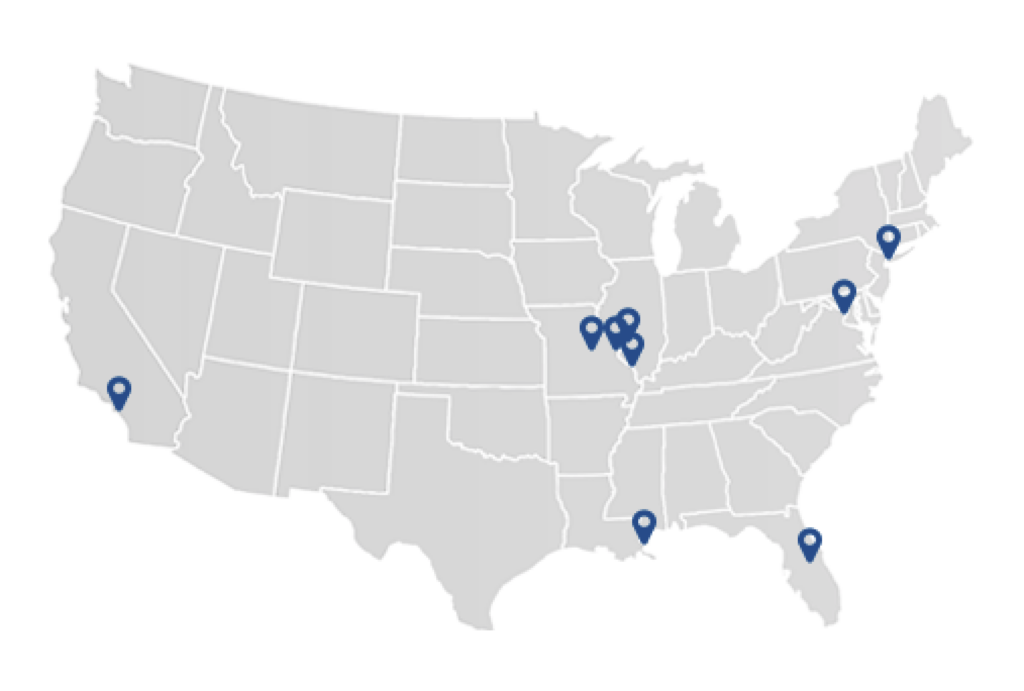Types of Mesothelioma
Mesothelioma is a rare and aggressive cancer caused exclusively by asbestos exposure. It can develop in various body parts and present different symptoms based on location and cell type. Understanding these variations is crucial for early detection and effective treatment.
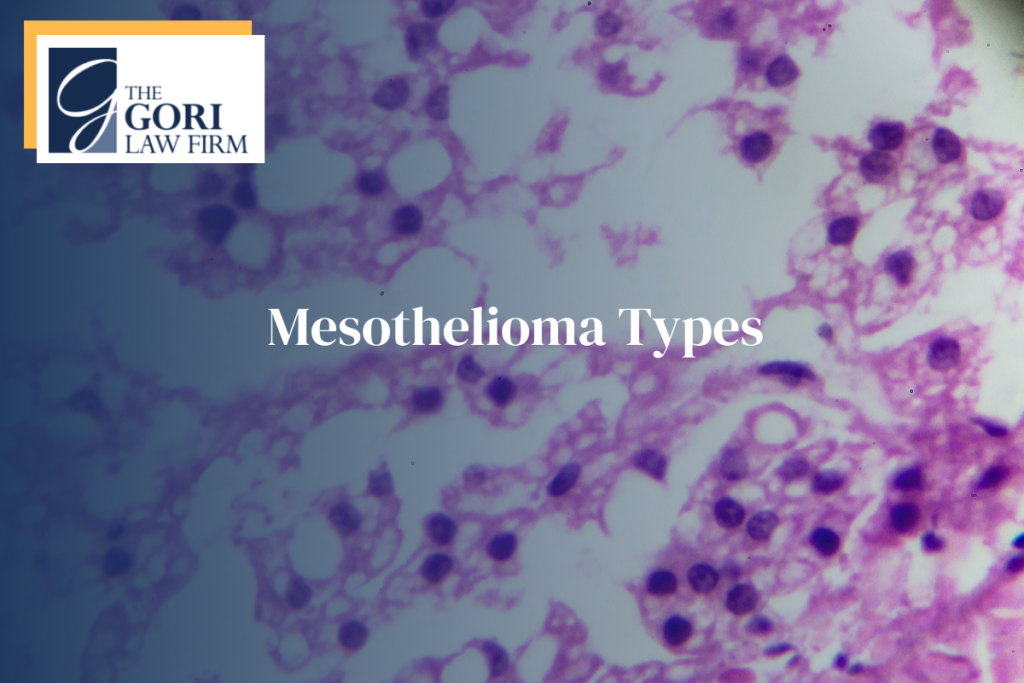
Home » Nationwide Mesothelioma Lawyers » Types of Mesothelioma
- Content last modified:
Not all forms of mesothelioma are the same. Nearly all mesothelioma starts with asbestos exposure, but forms may vary according to location and cell type.
As the American Cancer Society explains, these cancers all affect the specialized cells that line your heart, lungs, abdomen and most of your internal organs. These cells create a lubricating fluid that allows the parts of your body to move against each other. Mesothelioma is a cancer in one of these linings.
Four different parts of the body
The different forms of mesothelioma are named according to the parts of the body in which they first appear. There are four primary locations, each of which presents its own symptoms:
- The lungs and chest. These pleural mesotheliomas make up more than three-quarters of all cases. Symptoms include chest pains, persistent coughing, unexplained weight loss, blood clots and shortness of breath.
- The abdomen. These peritoneal mesotheliomas comprise most of the remaining one-quarter cases. Symptoms include nausea, unexplained weight loss, fever, fatigue and abdominal swelling and pain.
- The heart. This is pericardial mesothelioma. Symptoms may include chest pains, uneven heartbeats, fevers, night sweats and shortness of breath.
- The testicles. Mesothelioma that begins in the lining around the testicles is known as mesothelioma of the tunica vaginalis. Such tumors often first appear as lumps on the testicle.
Pericardial mesothelioma and mesothelioma of the tunic vaginalis are both extremely rare.
Three different types of cells
Mesotheliomas are also grouped by their cell types. There are three main groups. Each indicates how responsive to treatment a tumor may be:
- Epithelioid. Epithelioid mesotheliomas feature larger, broader cells and tend to respond better to treatment. Most mesothelioma tumors are epithelioid.
- Sarcomatoid. Sarcomatoid mesotheliomas feature longer, spindle-like cells. These cells tend to be more aggressive and harder to treat. They account for roughly 10 to 20 percent of all cases.
- Biphasic (mixed). Biphasic mesotheliomas feature a mix of epithelioid and sarcomatoid cells. The aggressiveness and responsiveness of these tumors vary with the ratio of the two types of cells. These account for roughly 20 to 30 percent of all cases.
Every case is unique
As you can see, mesothelioma means more than one thing. Its symptoms and treatments vary according to its location and cell type. They also vary according to other factors, including the victim’s age and general health.
Differences aside, there is one thing that remains true across the board. People fare best when they catch the cancer early. To help your doctor diagnose a potential mesothelioma tumor, you want to be sure to share your history of asbestos exposure or talc use. Without this information, your doctor may spend more time looking in other, more common directions before considering mesothelioma.
Pleural Mesothelioma
Pleural mesothelioma affects the pleura, a sac surrounding the lungs that also contains the mesothelium membrane. It is the most common form of mesothelioma, but like all others, diagnoses made before the advanced stages of the disease are rare.
Pleural mesothelioma symptoms include:
- Chest pain
- Persistent cough
- Shortness of breath, difficulty breathing normally
- Fluid build-up around the lungs
- Blood clots
- Loss of appetite/rapid weight loss
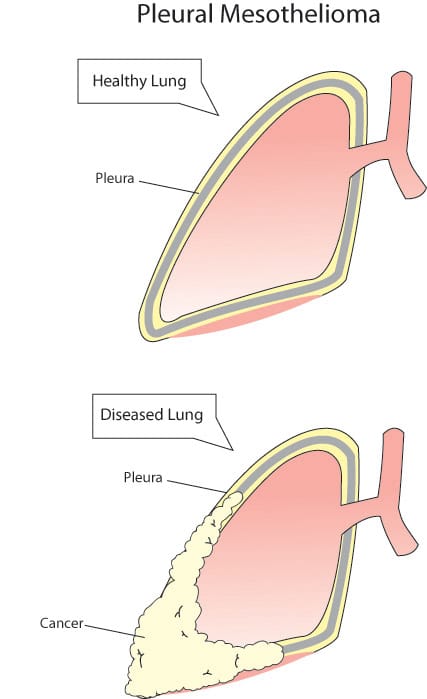
Peritoneal Mesothelioma
The abdominal cancer known as peritoneal mesothelioma affects the peritoneum (the area of the mesothelium that surrounds the abdominal cavity). The peritoneum has two layers, the “parietal” or outer layer, and the “visceral” or inner layer. Either layer or both may be affected by peritoneal mesothelioma.
On average, less than 500 new cases or peritoneal mesothelioma are diagnosed in the United States each year — very few of which are given before the disease has reached its advanced stages. Symptoms associated with this rare type of asbestos-related cancer include:
- Abdominal pain
- Swelling of the abdominal cavity
- Loss of appetite/rapid weight loss
- Fever
- Intestinal obstruction/impaired bowel function
- Anemia, general weakness or extreme fatigue
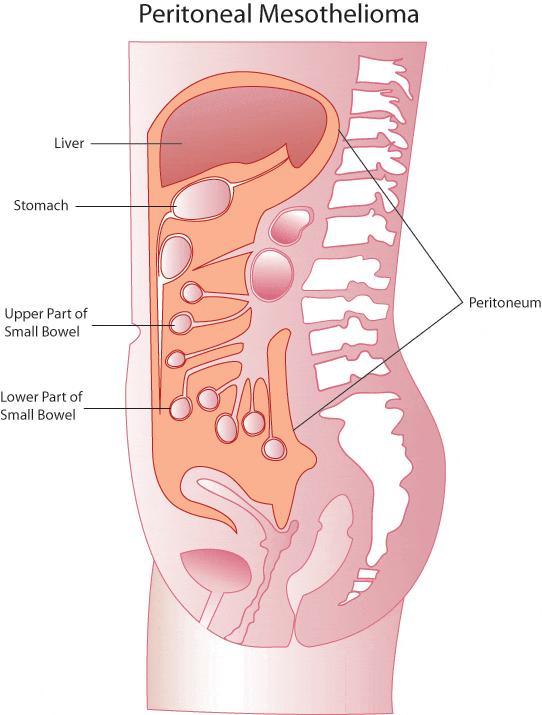
Pericardial Mesothelioma
Pericardial mesothelioma develops in the pericardium, a fluid-filled lining that surrounds and protects the heart. It is one of the rarest forms of mesothelioma and is generally seen only in patients who have had an extended amount of exposure to asbestos.
Pericardial mesothelioma is strongly associated with long-term asbestos exposure. In these cases, asbestos fibers become embedded in the pericardium. Once there, the naturally jagged shape causes inflammation to occur. Over time, scar tissue builds up from the inflammation and malignant cancer cells may begin to develop — eventually leading to a diagnosis of pericardial mesothelioma.
Associated symptoms of this disease include:
- Chest pain
- Persistent coughing
- Heart palpitations or irregular heartbeat
- Shortness of breath, difficulty breathing normally
- Fever/night sweats
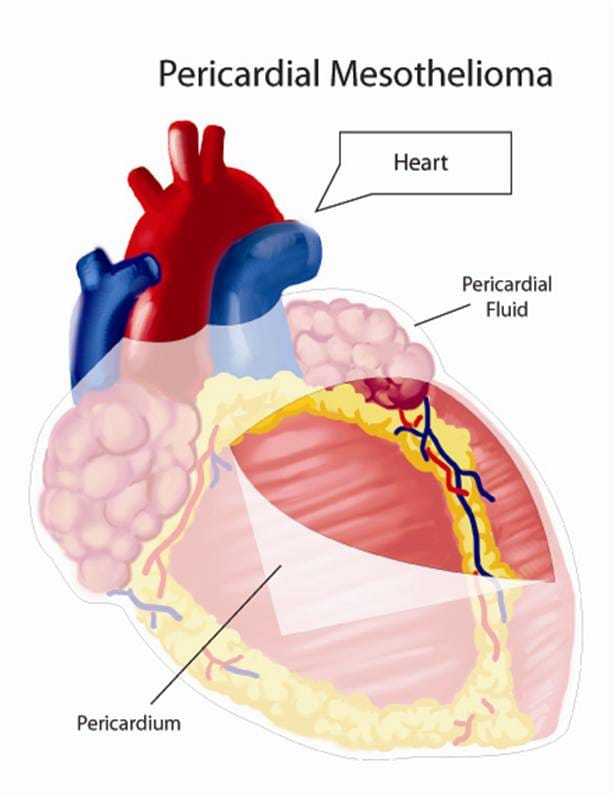
Testicular Mesothelioma
Testicular mesothelioma is the rarest type of asbestosis-related cancer, with less than 100 reported cases total. Unfortunately, the rareness of this disease has made it difficult for medical researchers to identify a definitive set of symptoms for diagnostic purposes. In fact, the only recognized sign of the disease is the appearance of testicular lumps. Treatment of testicular mesothelioma is usually removal of testicles, or in some cases, only a portion.
Nationwide Legal Help For Mesothelioma Victims And Families
The lawyers at The Gori Law Firm, offer decades of combined experience with mesothelioma lawsuits and are ready to start taking immediate action on your behalf today. For a free case evaluation, please call our law offices directly or contact us online. An experienced attorney will be available to discuss your potential lawsuit, answer your questions and address any other concerns you may have.
Contact Us Today
Get your free case review 24 hours a day.
Fields marked with an * are required
CASE RESULTS











